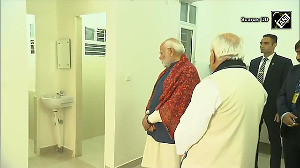 Pitching for industrial houses wanting to set up banks, the Economic Survey on Friday said that they should be given banking licences to promote the goal of financial inclusion.
Pitching for industrial houses wanting to set up banks, the Economic Survey on Friday said that they should be given banking licences to promote the goal of financial inclusion. "As regards allowing industrial houses, business houses and NBFCs to promote banks, they may be allowed full banking license with provision for avoiding conflict of interest issues," the 2010-11 Survey tabled in Parliament by Finance Minister Pranab Mukherjee said.
Providing access to banking facility to all citizens is one of the main objectives of the inclusive development agenda, it said.
While providing banking access, it said, the issue of regulatory robustness for the banking sector should not be compromised.
"Therefore, the issue of providing eligibility norms for new entities to operate as banks is of paramount importance," it said.
Following announcement made by the Finance Minister in the last Budget, the Reserve Bank had brought out a discussion paper in August 2010 on giving out new banking licenses to business houses and non-banking finance companies, and regulations for the same to foster greater competition.
The RBI also sought to know "whether industrial and business houses could be allowed to promote banks."
Also, if NBFCs should be allowed to convert into or promote banks. RBI has received comments on its discussion paper from all stakeholders and expected to come out with final guidelines in the coming months.
Various entities like Reliance Capital, IndiaBulls, Religare, IL&FS, IDFC, IFCI and Aditya Birla Financial Services are reported to be mulling entering the banking space. Presently, India has 27 public sector banks, seven new private sector banks, 15 old private sector banks, 31 foreign banks, 86 regional rural banks, 4 local area banks, 1,721 urban cooperative banks, 31 state cooperative banks, and 371 district central co-operative banks.
Besides, the survey said, Macro-Finance Institutions (MFIs) and Non-Banking Finance Companies (NBFCs) should be considered giving licence for only basic banking functions.
It said it is essential that the basic banking functions are clearly and objectively defined. The survey also suggested variable capital requirement for banks based on the operation.
"Minimum capital requirement for banks should be graded. Having two types of licenses namely one for providing basic banking to fulfill the obligation of financial inclusion and the other for full banking encompassing all activities of a commercial bank could be considered," it said.












 © 2025 Rediff.com -
© 2025 Rediff.com -